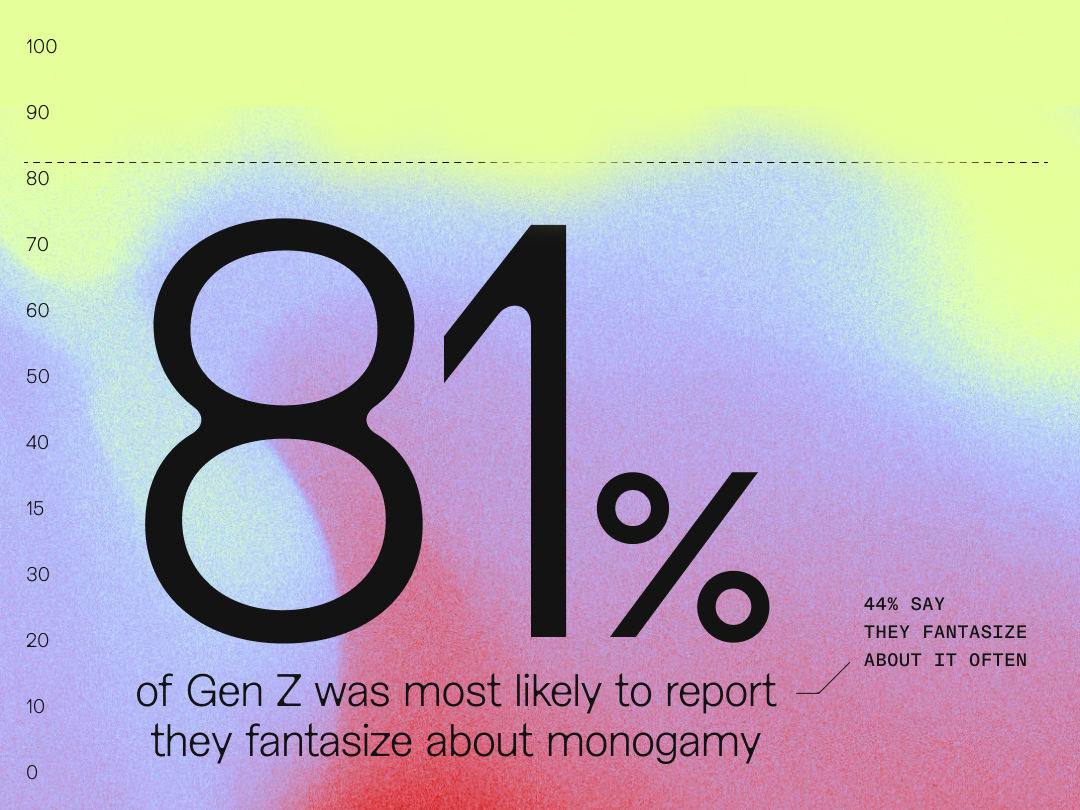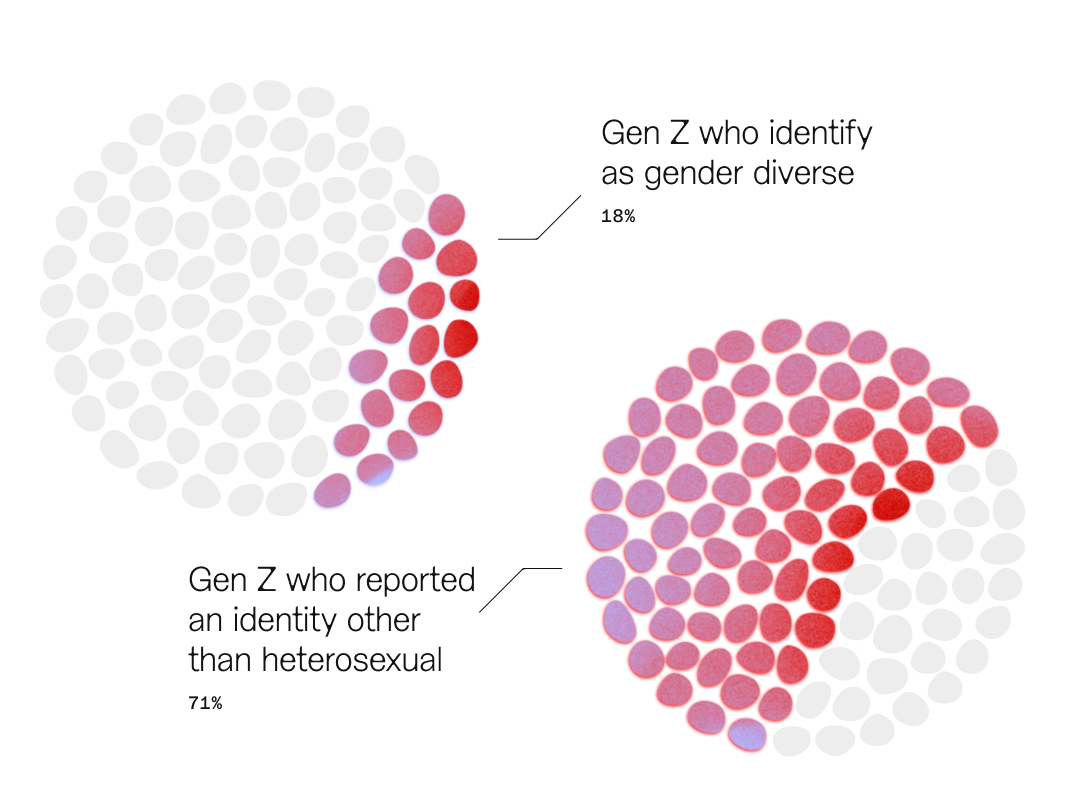
As will what everyone else wants. In an illuminating and reaffirming report from Feeld and Dr. Justin Lehmiller of the Kinsey Institute, we learn that Gen Z is imagining a new sexual future for all of us.
The distance between “I could never do that” to “I just did that” may be shorter than you think, sexually speaking. In the new State of Dating Report, co-authored by Dr. Justin Lehmiller of The Kinsey Institute and Feeld, it becomes apparent that our desires are not linear—their shape resists constraint. The commonly-held two-dimensional caricatures of generational differences surrounding sex, gender, and relationships are just that—flat renderings that show none of our complexity.
Which looks like Gen Z, the most kink-friendly generation, fantasizing about…drumroll please…monogamy. Or Boomers, the least fluid in gender and sexual identity, dreaming of taking their place in a polycule. More complex still, both generations are tied at the bottom (pun intended) for having the least amount of sex (of any generation, not of all time). From these findings, the only thing we know for sure is that each day brings new desires—ones you might not have even heard of yet.
Click here for the complete report.
Who responded?
We surveyed 3,310 Feeld Members across 71 different countries.
United States (59.7%), United Kingdom (13%), Canada (7.3%), and the Netherlands (3.5%).
65.3% identified as male, 25.7 female, 9% non-binary, trans, or other genders.
Sexual orientation (42% heterosexual; 15% heteroflexible; 15% bisexual; 8% pansexual; 7% queer; 13% other orientations).
Age, from 18-75.

What did they say about relationships?
Members of different generations expressed strikingly different relationship style preferences. Among Gen Z, monogamy was the single most preferred relationship type (23%). For Millennials and Gen X, it was ethical non-monogamy (24% and 27%, respectively), while for Boomers, it was friends with benefits (27%).
While many young adults seem more open than ever to deviating from monogamy compared to generations before, monogamy retains a distinct appeal to many Gen Zers.
Zooming out, consider Kinsey Institute research from a broader survey of 4,175 American adults, ranging in age from 18-88. In this study, Dr. Lehmiller asked participants about the extent to which they fantasize about different relationship structures. What he found aligns with the findings from Feeld Members.
- Gen Z was the most likely to report that they have fantasized about monogamy (81%) and to say that they fantasize about this often (44%).
- Among older generations, there were no meaningful differences between groups in fantasies about monogamy, with 71% saying they have fantasized about it before and 23-27% saying they fantasize about this often.
- Conversely, Gen Z was the least likely to report that they have fantasized about being in an open relationship (62% said they’d had the fantasy, with 18% fantasizing about it often).
- Among Millennials, Gen X, and Boomers, 75-80% said that they have fantasized about an open relationship, with 31-32% saying they fantasize about it often.
Put another way, Gen Z is nearly twice as likely to say that they have frequent fantasies about monogamy than older generations.

Why does Gen Z ♡ Monogamy?
There are several possible explanations:
We want what we don’t have.
Nearly half of Gen Z reported that they were single, compared to only one-fifth of Millennials, Gen X, and Boomers. Many younger adults have never even had a serious or committed relationship with one person, let alone several at the same time. In this light, it becomes easy to see how monogamy might hold a distinct appeal for this population. For a lot of Gen Zers, monogamy is simply something they haven’t yet experienced, whereas for older adults who have had more practice with monogamy, they may be wanting to try something new.
Romanticizing your (romantic) life.
At the same time, a current trend among Gen Z is the romanticization of traditional relationships and roles. There is a certain appeal to “how things used to be,” in the sense that they just seemed simpler.
As dating has moved into the digital world, it has only become more complex. On the one hand, we have more options and opportunities to connect than ever before, which is a positive development.
But on the other hand, people are still figuring out the rules of engagement. Many struggle with the inherent ambiguities that arise when conversing and interacting in a virtual context. Traditional courtship practices necessitated clear intentions and grand gestures that made it clear where things stood, so it’s no surprise that they’re gaining appeal in a time that feels more uncertain and unclear than ever.
However, this isn’t to say that Gen Z has more conservative intimate values across the board. While many of them are reverting to more traditional relationship values, Gen Z is breaking the mold by holding the most expansive views on sexuality.

Gen Z is fluid with it.
When it comes to gender and sexuality, Gen Zers are exploring at much higher rates than any past or current generation, which can be seen in terms of how they identify. In the Feeld Member survey, 18% of Gen Zers identified as gender diverse, while 71% reported a sexual identity other than heterosexual. However, their identities are not necessarily constant and often evolve as Members use the app.
For those who reported a change in their gender, non-binary was the most common current identity reported. More often than not, these changes went in the direction of holding a more expansive gender identity. For those who reported a change in their sexuality, heteroflexible was the most common current identity reported. In most cases, sexual identity changes went in the direction of identifying as queerer or less heterosexual.
What all of this tells us is that Gen Zers on Feeld are exhibiting the most fluidity in both sexual and gender identity.
Which makes sense. Unlike generations that came before, Gen Z has embraced the idea that both gender and sexuality are not binary. Today, there are more terms to describe your own unique gender and sexuality than ever before, and young adults are continually expanding our vocabulary and creating new terms to encapsulate their identities and experiences. For example, just consider that the terms “non-binary” and “pansexual” were not even part of the cultural lexicon for any previous generation when they were in their teens or twenties. Gen Z may just be starting to discover who they are, but they also simply have more options (and more freedom) to be who they really are.

And what of kink?
It may come as no surprise that kink is openly embraced by Gen Z. On Feeld, they lead the pack, with 55% saying they’ve discovered a new kink since being on the app. Following close are Millennials at 49%, Gen X at 39% and Boomers at 33%.
Why is this?
There are at least two explanations for this. One is simply that older adults have had more time to learn and discover what they enjoy about sex, so they may have already uncovered their kinks. However, the other is that it also appears to be the case that younger adults today have a greater overall interest in kink than older adults, which may create greater openness to exploring and learning about one’s kinks. They’re exploring their sexuality today, and are doing so in an environment where kinks are discussed more openly than ever and where, for many, they have become an identity unto themselves.
For older adults, kinks and BDSM may carry more baggage. It is simply easier to explore your kinky side when you aren’t working against years (or decades) of cultural conditioning telling you that kink is “abnormal” or “wrong.” Put another way, older adults may hold back from kinks in both fantasy and behavior, in part, because they grew up learning to feel more shame around them. This may create more mental barriers to exploring their sexuality that can be difficult to knock down.
In conclusion
Gen Z is kinkier and more fluid in both their gender and sexuality compared to Millennials, Gen X, and Boomers. And while there has been a wide embrace of ethical non-monogamy among many of today’s young adults, we also see that they hold complex views on relationships, given that they are simultaneously the generation that seems most inclined toward monogamy.


